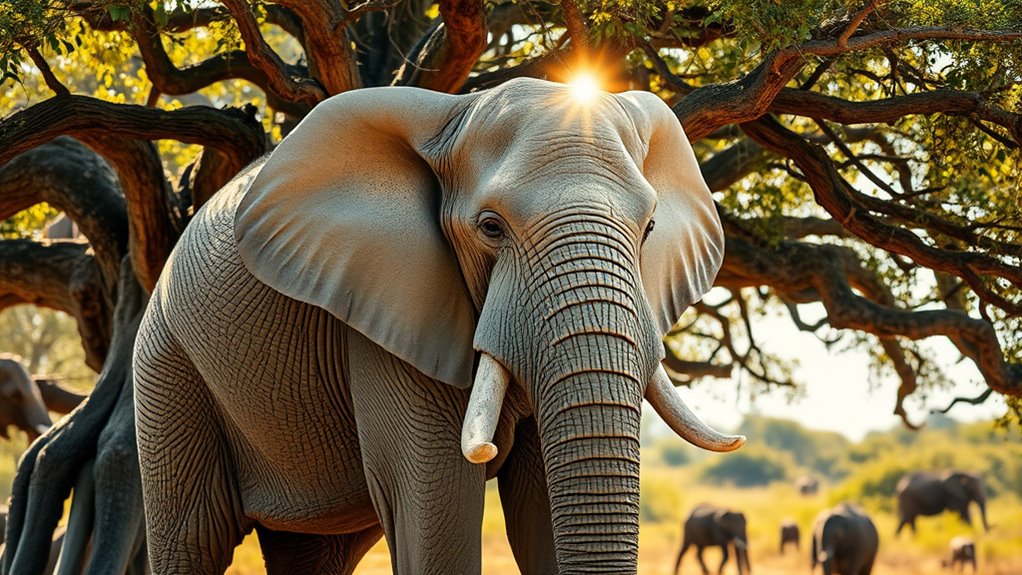Elephants symbolize memory, strength, and luck, reflecting qualities you can admire and incorporate into your life. They remind you of the importance of honoring the past, staying resilient during challenges, and embracing good fortune. Across cultures, elephants are revered as sacred beings and spiritual guides, encouraging patience, loyalty, and wisdom. If you want to uncover more about their rich cultural and spiritual meanings, keep exploring how these majestic creatures inspire us all.
Key Takeaways
- Elephants symbolize memory, emphasizing the importance of honoring the past and learning from experiences.
- Their strength represents resilience and the ability to overcome challenges.
- Elephants are considered symbols of luck and good fortune across many cultures.
- They embody patience, loyalty, and spiritual connection, guiding personal growth.
- Their presence inspires reflection on virtues like wisdom, stability, and positive energy.

Elephants have long been symbols of strength, wisdom, and good luck across various cultures. When you encounter these majestic creatures, you may find yourself drawn to their powerful presence and gentle demeanor. Their significance isn’t just about their impressive size; it deeply ties into cultural interpretations and spiritual symbolism that have persisted for centuries. In many traditions, elephants represent more than just physical strength—they embody qualities like patience, loyalty, and a deep connection to the spiritual domain. You might notice that in different parts of the world, elephants are revered as sacred beings, often featured in rituals and stories that emphasize their role as protectors and guides. Their symbolism extends beyond physical attributes, acting as messengers that encourage you to cultivate wisdom and resilience in your own life.
Understanding the cultural interpretations of elephants helps you appreciate why they hold such revered status. In Indian culture, for example, the elephant-headed god Ganesha is widely worshipped as the remover of obstacles and the patron of new beginnings. When you see an elephant in this context, it’s a reminder to approach challenges with patience and a positive outlook. In African traditions, elephants symbolize community and social bonds, emphasizing the importance of family and collective strength. Recognizing these cultural meanings allows you to see elephants as more than animals—they are living symbols of spiritual values that can guide you through your personal journey. Their presence in art, folklore, and religious practices underscores their role as spiritual symbols representing stability, wisdom, and good fortune.
The spiritual symbolism of elephants often encourages you to reflect on your own qualities. Their memory, for instance, signifies the importance of honoring the past and learning from it. If you’re facing difficult decisions or seeking clarity, contemplating the elephant’s ability to remember and recognize individuals can inspire you to value your own experiences and lessons learned. Their strength reminds you to stay resilient in adversity, while their association with luck urges you to remain hopeful during uncertain times. When you see an elephant, whether in a dream, a piece of art, or in real life, it’s a prompt to embrace qualities like patience, loyalty, and spiritual awareness. Ultimately, elephants serve as powerful symbols that remind you of the enduring strength of wisdom and the importance of nurturing positive energies in your life.
Frequently Asked Questions
How Do Elephant Symbols Vary Across Different Cultures?
You’ll find that elephant symbols vary across cultures due to regional differences and unique beliefs. In Indian culture, elephants represent wisdom, luck, and spiritual strength, often seen in religious rituals. In Africa, they symbolize power and community, reflecting social bonds. Conversely, in Western traditions, elephants are mainly associated with memory and patience. Understanding these cultural interpretations helps you appreciate the diverse significance elephants hold worldwide.
What Are Common Misconceptions About Elephant Symbolism?
You might think elephant symbolism is just about luck or strength, but myths often oversimplify their rich meaning. Some believe elephants are only symbols of power, ignoring their deep ties to memory and wisdom. Elephant symbolism facts reveal their significance across cultures, but misconceptions can lead you to overlook their true cultural and spiritual depth. Recognizing these myths helps you appreciate elephants beyond just luck or brute strength.
How Can I Incorporate Elephant Symbolism Into My Home Decor?
You can incorporate elephant symbolism into your home decor by adding elephant figurines on shelves or tables, which bring a sense of strength and luck. Consider wall art designs featuring elephants to create a focal point and inspire positive energy. Choose pieces that resonate with you, like modern or traditional styles, to reflect your personality. These elements not only beautify your space but also infuse it with meaningful symbolism.
Are There Specific Colors Associated With Elephant Symbolism?
You’ll find that specific colors associated with elephant symbolism include gray, reflecting their natural appearance and representing stability and wisdom through elephant color meanings. Cultural color associations also highlight red for luck and protection, white for purity and peace, and gold for prosperity. Incorporating these colors into your decor can enhance the symbolic meaning, creating a space that promotes strength, memory, and good fortune.
How Do Elephants Symbolize Leadership and Community in Mythology?
In mythology, elephants symbolize leadership and community through their presence in art and folklore. They lead with strength, protect with wisdom, and foster unity among their herd. Elephants in art often depict their role as guardians and guides, while elephants in folklore highlight their importance as symbols of authority and cooperation. You see this through stories where elephants unite communities and demonstrate noble leadership qualities, inspiring respect and harmony.
Conclusion
As you embrace elephant symbolism, remember their lessons of memory, strength, and luck. These majestic creatures remind you to hold onto valuable lessons, face challenges with resilience, and believe in good fortune. Like the saying goes, “An elephant never forgets,” so let their wisdom guide you through life’s journey. By embodying their qualities, you can navigate obstacles with confidence and attract positivity into your life.










